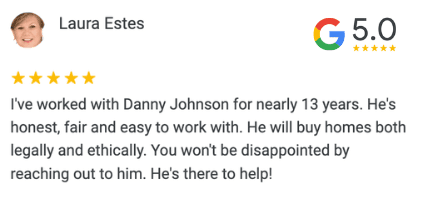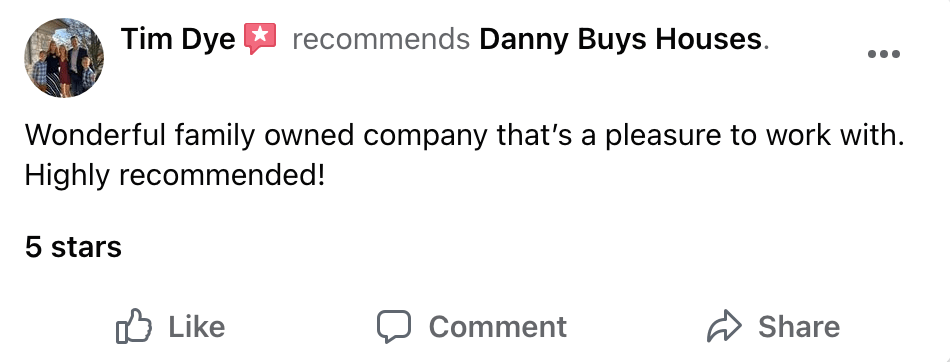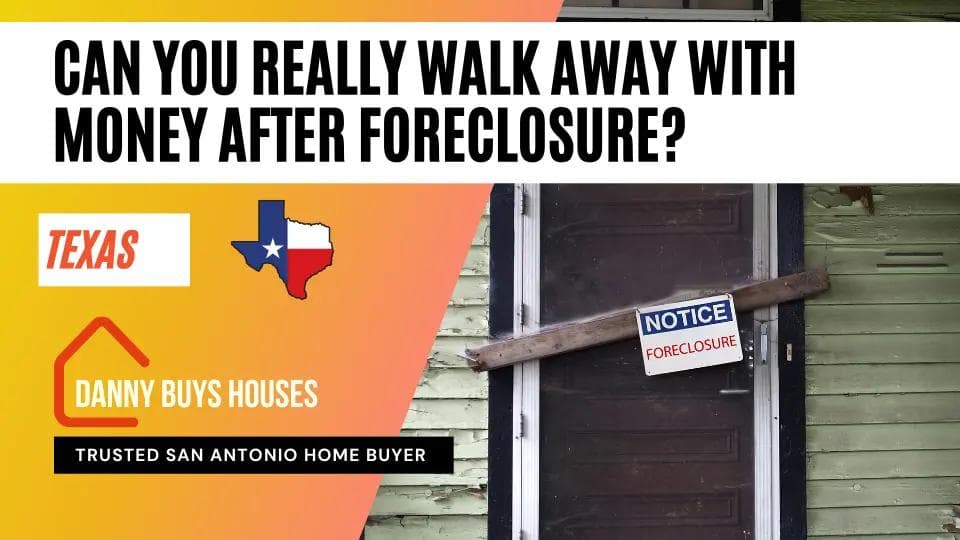
Can You Really Walk Away With Money After Foreclosure? The Shocking Answer!
By Danny Johnson | Updated 9/27/2024, 1:48:23 PM
Discover the truth about foreclosure: Can you get money if your house is foreclosed? Learn how excess funds from a foreclosure sale can benefit you.
- Key Takeaways
- Do you get any money if your house is foreclosed?
- Do I still owe the bank money after a foreclosure?
- What happens if the foreclosure sale does not satisfy the debt?
- Can a mortgage company come after you after foreclosure?
- Alternatives to Foreclosure: Exploring Your Options
- Loan Modifications and Repayment Plans
- Short Sales: A Potential Way Out
- Deed in Lieu of Foreclosure: Surrendering Your Property
- Skip the Hassles: Sell Fast to a Cash Home Buyer
🗂 Table of Contents
The fear of losing your home is overwhelming. I remember when the word "foreclosure" was mentioned daily in the news in San Antonio, TX around 2008. It felt like a dark cloud, leaving families unsure about their future.
But what if I told you there's more to the story? Foreclosure isn't just about losing your house. It's a complex process that raises questions about money, debt, and your financial future.
Many facing foreclosure wonder if there could be excess funds after the property sells at auction. What happens to that money?
Does an attorney get it? Does the homeowner receive any money? Does the county get it?

After the 2008 real estate crash, mortgage companies became stricter. They looked closely at credit scores, debt ratios, and personal finances. But life can change suddenly. Job loss, medical bills, or a drop in home value can turn a dream into a nightmare.
The question remains: Can you really walk away with money after foreclosure?
Let's dig in to where he funds from a foreclosure sale go at the foreclosure proceedings.
Key Takeaways
- Most Texas foreclosures are non-judicial, governed by specific state laws
- There's a four-year statute of limitations on foreclosure actions in Texas
- Post-2008 crash, mortgage requirements became stricter
- Life events can trigger missed payments and potential foreclosure
- Options like loan modifications and short sales exist to avoid foreclosure
- The foreclosure process can impact your finances beyond losing your home
Do you get any money if your house is foreclosed?
When a home faces foreclosure, homeowners often wonder if they'll get any money. The answer depends on several factors. The main thing is how much the home sells for compared to what's owed on the mortgage.
In rare cases, if the home sells for more than what's owed, the homeowner might get some money. This is not common, especially in a bad housing market. Usually, homes sell for less than what's owed, leaving homeowners with nothing.
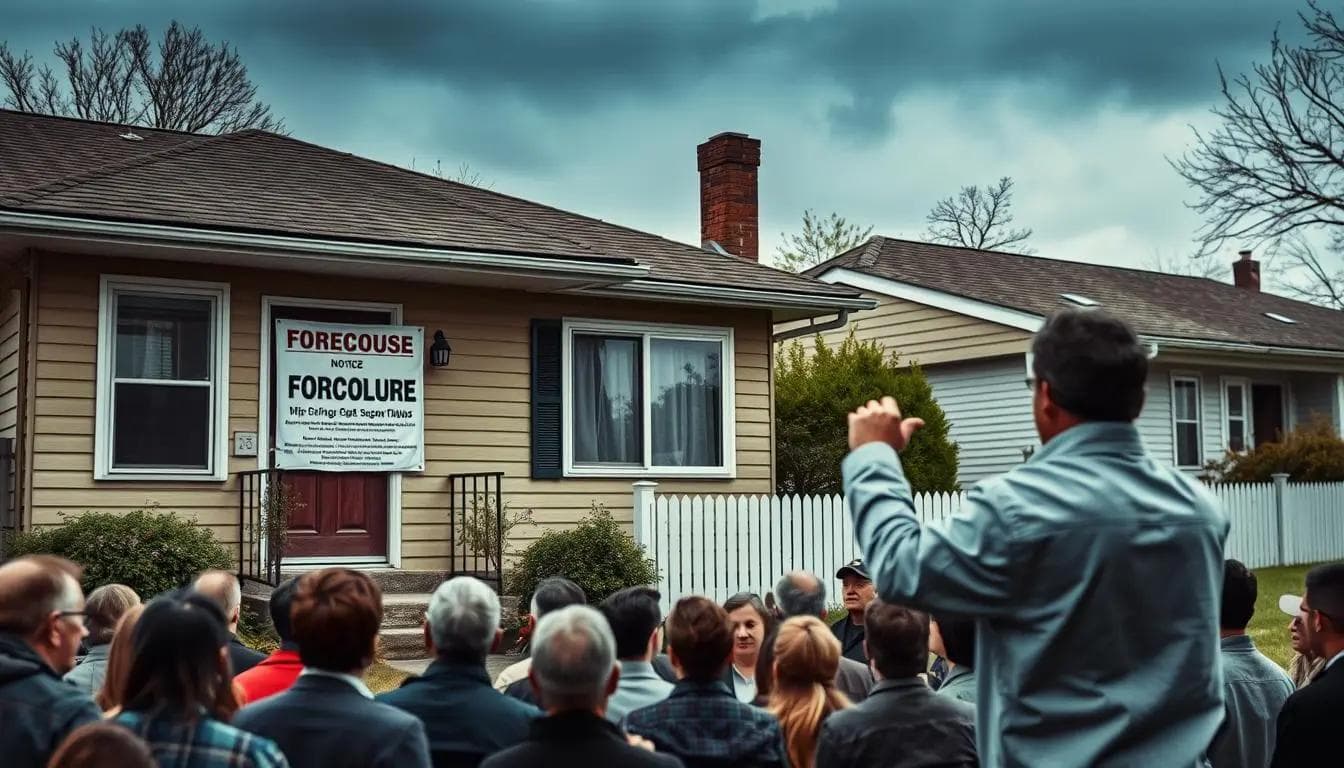
- In Texas, most foreclosures occur without court involvement
- How much owed is not just the mortgage principal balance
What is owed is made of more than just the principal balance. This balance owed will include:
- Outstanding mortgage balance
- Accrued late fees
- Attorney's fees
- Other foreclosure costs
According to Experian, "Remember, the foreclosure procedure itself costs money. The lender will use sale proceeds to pay for the foreclosure, late fees, penalties and missed payments."
Foreclosure can hurt your credit and lead to tax issues. If you're facing foreclosure, get help from a HUD-approved housing counselor. HUD is the department of Housing and Urban Development. They can help you talk to your mortgage lender.
This can make it hard on homeowners that do not have any where to move to. In most cases, you cannot stay in your home after foreclosure in Texas.
Remember, foreclosed homes usually sell for less than market value of the property. This makes it harder to get any money back after the sale.
Do I still owe the bank money after a foreclosure?
Foreclosure doesn't always mean you're off the hook financially. Often, you still owe money to the bank after losing your home. This debt is called a deficiency, which happens when the sale price is less than what you owe.
Lenders might try to get this money back through a deficiency judgment. In Texas, this is allowed by law.
According to NOLO, "Even after you lose your home to foreclosure, you might still owe money to the lender. When foreclosure sale proceeds aren't sufficient to repay the full amount of a mortgage loan, the difference between the sale price and the total debt is called a "deficiency.""
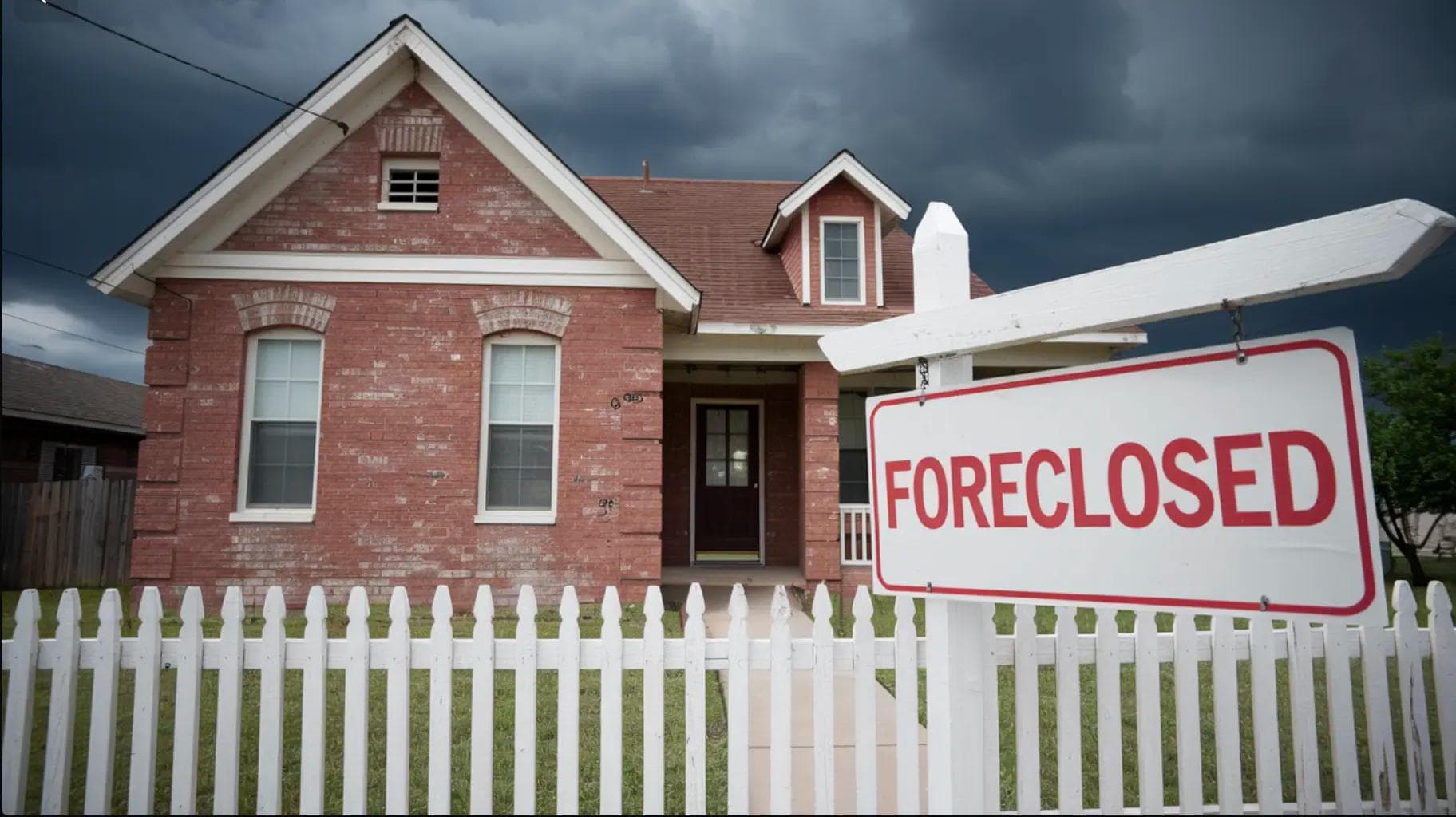
This can really hurt your credit. A foreclosure stays on your report for seven years, making it tough to get loans or rent. Plus, there are tax implications. The IRS might tax the forgiven debt, adding to your financial stress.
Looking for other options before foreclosure is smart. You might be able to work out a new payment plan or consider a short sale. In some cases, bankruptcy could protect you from having to pay a deficiency judgment.
According to Justia.com, "When you file for bankruptcy, the court will issue an automatic stay. This order requires creditors to stop trying to collect debts. The order includes a requirement that a mortgage holder cease foreclosure activities. If the lender has already scheduled your home to be sold at auction, the sale will be legally postponed for three to four months, unless the creditor successfully brings a motion to lift the stay. Even if a motion to lift the stay is brought successfully, the sale will likely be postponed, which can give you time to make other plans."
Be careful though. Bankruptcy can affect your credit even more than foreclosure.
According to Experian, "Your payment history is the most influential factor in determining your FICO® Score☉, and bankruptcy one of the worst things that can happen to your credit. Depending on your situation, a bankruptcy record can knock up to 200 points off your credit score."
Remember, the rules about foreclosure and deficiency judgments are complex and different in each state. It's a good idea to talk to a lawyer to understand your situation and find the best options for you.
What happens if the foreclosure sale does not satisfy the debt?
If a foreclosure sale doesn't cover the mortgage debt and other liens, lenders might go after a deficiency judgment. This lets them try to get the remaining money from the borrower. The rules for this vary by state, with some places not allowing it after certain foreclosures.
In judicial foreclosures, the court figures out how much is owed. This is the mortgage debt minus the property's value or sale price, whichever is more. State laws are key in this, setting rules for lenders to get a deficiency judgment.
Borrowers have rights during foreclosure. For example, they can try mediation in some states to find other solutions like loan changes. They can also fight the foreclosure if they think there were mistakes.
- Foreclosure can't start until a borrower is at least 120 days late on payments
- Mortgage servicers must send a breach letter around the 90th day of delinquency
- State laws require notice of pending foreclosure to homeowners
- Some states allow borrowers to reinstate the loan before the scheduled sale
Knowing your rights and the risk of a deficiency judgment is key for homeowners facing foreclosure. Getting legal advice is a good idea to understand the process and find all possible solutions.
Can a mortgage company come after you after foreclosure?
Yes, mortgage companies can take legal action against you after foreclosure. In some places, they might ask for a deficiency judgment to get the loan's remaining balance. This can greatly affect your financial future.
Foreclosure will badly hurt your credit score. It makes it hard to get loans or credit in the future. Lenders can report the unpaid debt, making things even tougher.
Here are some key points to consider:
- Deficiency judgments let lenders collect the loan's unpaid balance.
- Your credit score might drop by about 100 points because of foreclosure.
- Foreclosure can stay on your credit report for up to 7 years.
In some cases, filing for bankruptcy might protect you from deficiency judgments. But, this choice has long-lasting effects and should be thought over carefully.
It's vital to know that some states protect homeowners from deficiency judgments. For example, in California, lenders can't sue for the loan's unpaid balance after foreclosure on a primary residence. Always check your state's laws or talk to a lawyer to know your rights and duties.
Alternatives to Foreclosure: Exploring Your Options
Facing foreclosure can be scary, but you have choices. Let's look at ways to keep your home or leave on better terms. These options can help you avoid the long-lasting credit damage of foreclosure.
Loan Modifications and Repayment Plans
A loan modification changes your mortgage terms to make payments more affordable. Your mortgage lender may lower your interest rate or extend your loan term. Repayment plans let you catch up on missed payments over time. About 40% of homeowners successfully stop foreclosure through these options.
Of course, any missed payments will remain on your credit report. This is still better than having a foreclosure on your credit report for the next 7 years!
Short Sales: A Potential Way Out
In a short sale, you sell your home for less than you owe, with your lender's approval. This option typically drops your credit score by 85-160 points - much less than foreclosure's 200-point hit. The process takes about 90-120 days, faster than foreclosure.
Deed in Lieu of Foreclosure: Surrendering Your Property
With a deed in lieu, you voluntarily give your property to the lender. This option takes around 90-120 days and may have a smaller impact on your credit than foreclosure. It can also relieve you from future mortgage payments.
Remember, a housing counselor can guide you through these choices for free. They'll help you understand which option fits your situation best. Don't wait - reach out to your mortgage lender or a counselor today to explore your alternatives to foreclosure.
Skip the Hassles: Sell Fast to a Cash Home Buyer
Dealing with foreclosure? A cash sale could be your quick fix. A local home buyer in San Antonio, like Danny Buys Houses, offer a helping hand. They purchase properties in San Antonio, Texas and surrounding areas.
Cash house buying companies allow you to get money fast so you can pay off your debt and avoid the foreclosure.
With cash home sales, you can sell your house quickly. Unlike traditional sales, which take 50-75 days, cash buyers can close in just 7 days. You also won't have to fix up the property - they buy it as-is.
Want a free consultation? Contact cash home buyers like Danny Buys Houses. They usually respond fast, often in hours, and can make a cash offer within 24 hours. Keep in mind, their offers might be lower, but you'll save on realtor fees and avoid foreclosure's credit hit.
If you have already received a notice of sale, you need to act fast. There isn't much time to waste.

AUTHOR
Danny Johnson
Owner and Founder at Danny Buys Houses
Danny Johnson is an experienced real estate investor who has been buying houses for cash since 2003. As owner of Danny Buys Houses, Danny's goal is to help homeowners sell their house fast, regardless of the situation, so they can move on with their life.
Danny has been featured in publications such as Forbes, Realtor.com, BiggerPockets, Yahoo Finance, US News, and more. He is also the author of the book 'Flipping Houses Exposed'.


